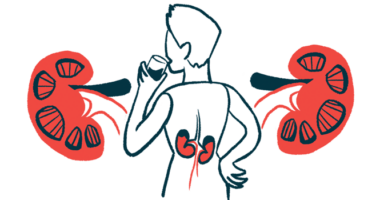Diving Into a Sea of Denial

Before I was diagnosed with granulomatosis with polyangiitis (GPA) at age 19, I was ready to conquer the world. After the diagnosis, I just wanted to conquer the condition.
At first, I was extremely focused on finding out everything I could about GPA. Every detail, every bit of information, and every experience I read about made my heart sink even more. The most difficult fact to handle was that there is no cure. I would have this the rest of my life.
Reading about the vast number of symptoms and possible medical issues was overwhelming. I know now that not everyone with GPA has every single symptom, but I didn’t know that then.
I was on Cytoxan (cyclophosphamide) and prednisone at the time. The medications came with long lists of possible side effects, some of which were terrifying. The side effects combined with the symptoms were just too much for me to handle.
In an effort to find out more, I tried to join an online support group. Everyone in that group was at least in their 70s and had worse symptoms than I did. I couldn’t take the thought of that being me one day, and I only lasted two meetings.
All of that information led to me making a big mistake. Instead of talking to my doctor, or to anyone, I hid from it all. I dove into a sea of denial, and I pretended like everything was normal.
That “strategy” only made things worse. If I had a medical issue, such as a cold, I took care of it myself and wouldn’t tell my doctor about it. I would have some sort of strange symptom, and then play it off like nothing was wrong. Every trip to the doctor’s office was “I’m fine,” even if I wasn’t.
And I regret all of that. It was bad enough to not say anything about possible symptoms, but I didn’t even talk about the side effects I was experiencing from the medications. That was nearly disastrous.
The side effects hit me hard. The most obvious symptoms of the prednisone were massive weight gain, “moon face,” and horrible acne. The Cytoxan, though, was worse. The strong medication helped control my GPA, but it also really damaged me. The biggest and most obvious side effect was that I stopped having my period, which should have been a gigantic red flag for me.
I didn’t even tell my doctor about that until it was too late. My doctor, who was not the one who diagnosed me or first prescribed my medications, at one point asked how long I had been on Cytoxan. About two years, I answered, as I watched his eyes widen. He immediately changed my prescription to methotrexate and told me I had been on Cytoxan too long.
That’s when I decided to tell him about my period, and he advised me that I may be unable to have children. He also warned me of the risk of bladder cancer. That information came like a one-two punch.
But it was the jolt I needed to get back to reality. I stopped ignoring my health issues and started keeping track of them instead. I could no longer ignore the massive weight gain, so I went on a diet.
It’s very difficult to lose weight while on prednisone — I remember eating an entire package of Oreos in one sitting because of the cravings. Eventually, I was able to rid myself of the bad eating habits. When I finally was off prednisone, the weight started to come off, and I lost 60 pounds.
I started paying attention to my limitations and realized there would be things I simply couldn’t do, but there were still plenty of other things I could do. I finally accepted that I have GPA, which was a victory by itself. Maybe I couldn’t conquer the condition, but I would not stop fighting.
***
Note: ANCA Vasculitis News is strictly a news and information website about the disease. It does not provide medical advice, diagnosis, or treatment. This content is not intended to be a substitute for professional medical advice, diagnosis, or treatment. Always seek the advice of your physician or other qualified health provider with any questions you may have regarding a medical condition. Never disregard professional medical advice or delay in seeking it because of something you have read on this website. The opinions expressed in this column are not those of ANCA Vasculitis News or its parent company, BioNews, and are intended to spark discussion about issues pertaining to ANCA vasculitis.






Comments
Fayruze Noor
Informative, all articles by Sandra Ross. I take care of a dad diagnosed with ANCA Vasculitis and felt alone as well as the only person that understands how he battles this disease especially during the morning. So thank you for sharing.